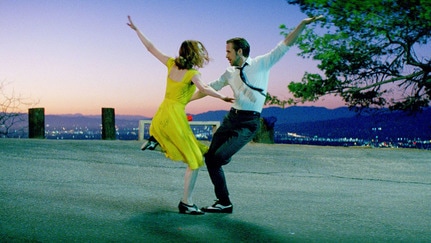As Seb and Mia keep running into each other, chance encounters bloom into a supportive and romantic relationship, with each reinforcing the dreams of the other and debating the specific form those dreams should take. As good partners, they complement each other and push each other to reach for the next rung on the ladder. He encourages her to forget the futile auditions, and instead write something for herself. After he joins a pop band formed by friend Keith (John Legend), she reminds him that this is not where he's supposed to end up, an albeit well-paid backup player performing music he doesn't enjoy. Telling these kinds of truths to each other generates friction in their relationship, even as they each can acknowledge that the other is right in their counsel.
Chazelle never lets the viewer forget that La La Land is beholden to tradition and cultural history, both in the elemental choice to make his romance into a musical and in the production design that puts his two leads squarely in the past. Musicals are rare things, and he's harkening back to days when that wasn't the case. His Busby Berkeley opening homage leads into another big choreographed number at a Hollywood party, before quieting down into Singin' In the Rain ballads and twofers. The personal tics and preferences of his leads are as stuck in the past as the choice to make a musical. Seb is introduced fiddling with a tape deck in his old convertible. Mia's apartment is decked not with contemporary actresses but with icons of Hayes-era Hollywood. The futures the characters want for themselves have already happened to their antecedents, with Seb wanting to be Chet Baker and Mia envying Ingrid Bergman. Chazelle ably unites the medium with his characters, allowing his film to contain both smart phones and a timeless feel.
Where La La Land falls down is in trying to decipher how the film feels about Seb's and Mia's goals. Amongst the catchy songs and winning performances is a muddled message. On the one hand, it's admirable to chase one's ambition. On the other hand, not every 10 year old can be an astronaut. In this regard, the film is kinder to Seb than it is to Mia. He does seem to be a talented keyboard player. When Keith's band plays to a raucous crowd, it's the most rousing scene of the film, and one in which Seb is recognized by the band and the crowd as a strong performer. However, because it's not owning a jazz bar, Seb treats this triumphant performance as a compromise and a loss. It's impossible to associate the adrenaline generated by the scene with any kind of defeat, and this makes Seb into something of a compelling anti-hero, where he's defined success so narrowly, that he doesn't recognize it when it presents itself to him. His intransigence and demand that the world conform to what he wants makes him a full character in line with Chazelle's creations in Whiplash.
However, with Mia, it's never clear that she is a talented writer or actress. The film belittles what she wants by making her excited to get hacky parts. In comparison, Seb sulks his way through 80's cover band gigs to pay the rent. The viewer doesn't get a peek at the one-woman show she puts on, and the auditions she goes on are for parts that were farted out by disinterested writers and impossible to improve on through a performance. Seb says her script is good, but he's also her boyfriend. She also doesn't communicate as clearly why she wants to be a successful actress beyond feeling a kinship with the actresses on her wall. Seb's goals are specific; hers are generic. She lives with three other aspiring actresses, none of which are distinguishable, and there are thousands more like her at any given moment. Luck plays a tremendous role in her storyline, and in storytelling, another name for luck is deus ex machina. If Chazelle's goal is to communicate that success is about the right place at the right time, that opportunity is an accident waiting to happen (per Radiohead), then I have no idea what to feel about the events of La La Land. It's Romanticism, the 'law' of attraction put onscreen, and it distanced me from a film that begs to be embraced.
The best of La La Land's musical numbers have a melancholy feel to them, but that feeling is only applied to some aspects of the story. Chazelle paints unevenly between the professional and the personal, wanting to get to bittersweet by the end but landing on unearned and inconsequential. I feel that he misjudges the stakes of his film, where he's more invested in the central relationship than this particular viewer was. This is further compounded by a device he uses that evoked other films with higher stakes, an ending that might have worked on some but failed with me. La La Land peters out, having spent much of its magic in its first hour. Perhaps this film is more for those who enjoy endless days of sun. I prefer some cold and a good storm now and then. B

 RSS Feed
RSS Feed